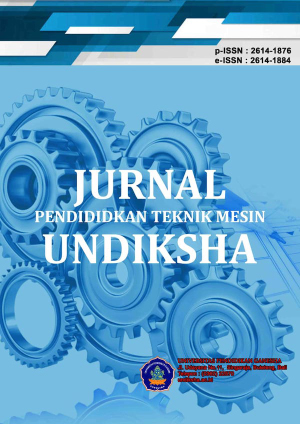Analisis Pengaruh Variasi Beban Pendinginan Ruangan Terhadap Unjuk Kerja Prototype Mini Water Chiller
DOI:
https://doi.org/10.23887/jptm.v10i2.43722Abstract
Dari waktu ke waktu teknologi mesin pengkodisian udara sudah mengalami perkembangan yang pesat. Mulai dari sistem untuk skala kecil (direct exspansion) hingga untuk skala besar (water chiller). Adapun prototype mini water chiller telah dibuat sebelumnya oleh mahasiswa konsentrasi pendingin program studi pendidikan teknik mesin undiksha belum pernah diuji performansinya dengan pemberian beban pendinginan pada kabin/ruangannya. Sehingga perlu dilakukan penelitian lanjutan untuk mengetahui bagaimana pengaruh variasi beban pendinginan yang mana dalam penelitian ini menggunakan variasi pembebanan temperatur 30 ºC, 35 ºC, 40 ºC, 45 ºC, 50 ºC terhadap laju pendinginan ruangan serta coefficient of performance (COP) pada unit prototype mini water chiller. Dalam penelitian ini metode yang digunakan adalah metode eksperimen (percobaan) dengan variabel bebas yaitu variasi beban pendinginan ruangan yang mana menggunakan variasi pembebanan temperatur 30 ºC, 35 ºC, 40 ºC, 45 ºC, 50 ºC yang diperoleh dari penggunaan hair dryer berukuran 400 watt serta variable terikat yaitu laju pendinginan ruangan dan coefficient of performance (COP) mesin pendingin. Proses pengujian dilakukan sebanyak 3 kali pengulangan pengambilan data pada setiap variasi pembebanan dengan total jumlah pengambilan data sebanyak 15 kali. Hasil dari pengujian mendapatkan data – data sebagai berikut : untuk laju pendinginan ruangan terendah terjadi pada pembebanan dengan temperatur 30 ºC sedangkan untuk untuk laju pendinginan ruangan tertinggi terjadi pada pembebanan dengan temperatur 50 ºC dan untuk coefficient of perfomance (COP) terendah terjadi pada pembebanan dengan temperatur 50 ºC sedangkan untuk coefficient of perfomance (COP) tertinggi terjadi pada pembebanan dengan temperatur 30 ºC.
Kata kunci : coefficient of perfomance (COP), laju pendinginan ruangan, prototype mini water chiler.
The rapid growth of air-coding technology from time to time. Ranging from a smal scale (direct expansion) to a large scale (water chiller system) the prototype mini water chiller has been made previously by cooling concentration students undiksha mechanical engineering education study program has never been tested for performance by providing cooling load on the cabin/room. So more research is needed to find out how the variations in cooling load in this study used variations in temperature loads of 30 ºC, 35 ºC, 40 ºC, 45 ºC, 50 ºC on room cooling rates and coefficient of performance (COP) on prototype mini water chiller units. The methods used in this study are comparative experiments with free variables that are variations in the cooling load of the room which uses variations of temperature loads of 30 ºC, 35 ºC, 40 ºC, 45 ºC, 50 ºC obtained from the use of a 400 watt hair dryer and variable bound that is cooling rate in the cab and coefficient of performance (cop) of cooling machine. The test process is carried out as many as 3 repetitions of data retrieval on each variation of the burden with a total amount of data retrieval of 15 times. The results of the test obtained the following data: for the lowest room cooling rate occurred at a charging temperature of 30 ºc while for the highest room cooling rate occurred at a charging temperature of 50 ºc and for coefficient of perfomance (COP) the lowest occurred at a charging temperature of 50 ºC while for coefficient of perfomance (COP) the highest occurred at a charging temperature of 30 ºC
Keywords : coefficient of perfomance (COP), room cooling rate, prototype mini water chiler.
Downloads
Published
Issue
Section
License
Copyright (c) 2022 Jurnal Pendidikan Teknik Mesin Undiksha

This work is licensed under a Creative Commons Attribution-ShareAlike 4.0 International License.

Jurnal Pendidikan Teknik Mesin Undiksha is licensed under a Creative Commons Attribution-ShareAlike 4.0 International License.









